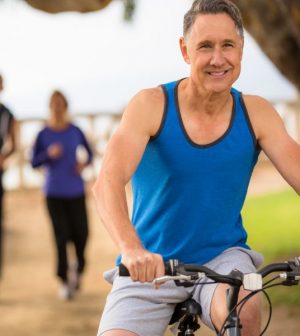- Could Your Grocery Store Meat Be Causing Recurring UTIs?
- Are You Making This Expensive Thermostat Error This Winter?
- Recognizing the Signs of Hypothyroidism
- 10 Strategies to Overcome Insomnia
- Could Artificial Sweeteners Be Aging the Brain Faster?
- Techniques for Soothing Your Nervous System
- Does the Water in Your House Smell Funny? Here’s Why
- Can a Daily Dose of Apple Cider Vinegar Actually Aid Weight Loss?
- 6 Health Beverages That Can Actually Spike Your Blood Sugar
- Treatment Options for Social Anxiety Disorder
Have Heart Disease? Exercise Will Help at Any Age

If you are older and you have heart disease, you might think you should take it easy. But new research suggests the opposite is true.
Exercise is especially beneficial for patients who have a physical impairment, the study authors found.
“Aging is associated with several factors such as increased inflammation or oxidative stress that predispose people to cardiovascular diseases. As a result, elderly patients are usually less fit than their younger counterparts, and deconditioning is accelerated once cardiovascular disease is established,” said lead investigator Gaelle Deley. She is with Faculty of Sports Sciences at the University of Burgundy Franche-Comte in Dijon, France.
For the study, the researchers analyzed the results of 733 patients who underwent 25 sessions of a cardiac rehabilitation program from January 2015 to September 2017.
The group was divided into three subgroups by age: under 65, between 65 and 80, and 80 and older.
“We found a few weeks of exercise training not only significantly improved exercise capacity but also decreased anxiety and depression. Patients with the greatest physical impairments at baseline benefited the most from exercise,” Deley said.
The report was published Oct. 8 in the Canadian Journal of Cardiology.
“Another interesting result was that patients younger than 65 who were very anxious before rehabilitation benefited the most from exercise training,” Deley said in a journal news release.
“A similar result was found for depressed patients older than 65,” she added. “These improvements will surely have a great positive impact on patients’ independence and quality of life, and might help both clinicians and patients to realize how beneficial exercise rehabilitation can be.”
More information
For more on cardiovascular disease and exercise, see the American Heart Association.
Source: HealthDay
Copyright © 2026 HealthDay. All rights reserved.










